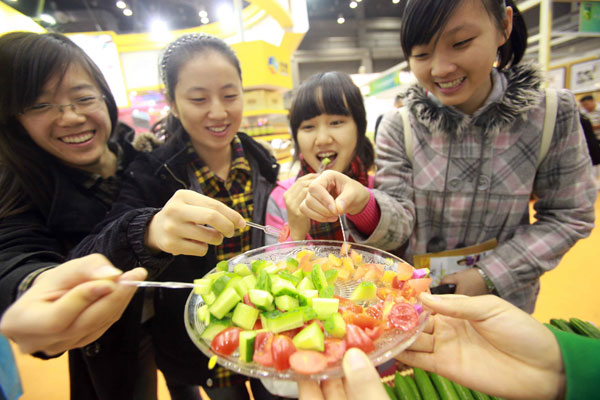Organic labeling can be food for thought
By Wu Wencong (China Daily) Updated: 2011-12-29 09:56
|
 |
|
People taste tomato and cucumber at the seventh China International Expo of Organic Food, held last month at the World Trade Center in Beijing. Although many vegetables sold at markets are labeled as organic, few have been certified. [Chen Xiaogen / for China Daily] |
New standards
A senior staff member from one of China's 23 official certification bodies, who spoke on condition of anonymity, disclosed that a new national standard will be unveiled in March to ease the chaos. The standard will include four important changes from the original, in 2005. This staff member has been working in organic food certification for about eight years.
He said the first two changes will concern the transition period, akin to probation, when a farm applies for the certification of land. It lasts for 24 or 36 months, depending on the crops grown there, and farms must begin following organic practices three or four months before the transition period.
Under the current standard, as soon as farms enter the transition, they can obtain yellow certification, indicating their products are moving toward organic. Green certification is granted only if the farm passes probation.
"The problem with this stage is that, under the current standard, a farm can get a transition period certificate, even if it only stopped applying chemicals on the crops three or four months earlier," the senior staff member said.
Under revised procedures, no certificates will be issued in the first 12 months of transition. "That is to say, the farm will have to stop using chemicals for at least 15 months before it can receive a yellow certificate," he said.
Also, farmers will not be allowed to label their products "organic transition food", which has been used to denote food that was better than ordinary but not as good as organic. The staff member also said the new regulations will set the acceptable level of pesticide residue at zero. The current standard allows "one-20th of that found in ordinary food".
In addition, serial numbers will be introduced for each product. Consumers will be able to check with the body that authorized the product on the website of China's Certification and Accreditation Administration.
'The price of faking'
The staff member said the administration of organic food has been getting tighter since a number of problems arose in 2003. Typical problems then, he said, were the sale of different certificates in bundles and charging fees for one certificate several years in advance, even though there's no guarantee the farm could pass the test in those years.
Issuing certificates is the only method for the bodies to gain income, he said, so there are incentives to issue them outside the rules. "I can't say that the new standard will solve all the problems with the certification of organic food right now," he said, "but the price of faking will be much higher."
He acknowledged that many customers are ignoring national certificates and relying on personal relationships with small farms so they can distinguish real organic food from fake.
"Unauthorized small farms are actually a good thing in this industry," he said. "Their products may not be 100 percent organic, but at least they are free of chemicals and pesticides."
- Seven villagers murdered in N China
- China steps up tobacco control efforts
- Five jailed for separatism in Xinjiang
- Letter asks for leniency in poisoning case
- Antibiotics in surface water pose 'indirect health risk'
- Tianjin airport opens up transit link to Beijing
- High levels of antibiotics in China's major rivers
- China to dig tunnel for Asian rail system
- Bering strait line to US possible, experts say
- China: Stop oil rig harassment







